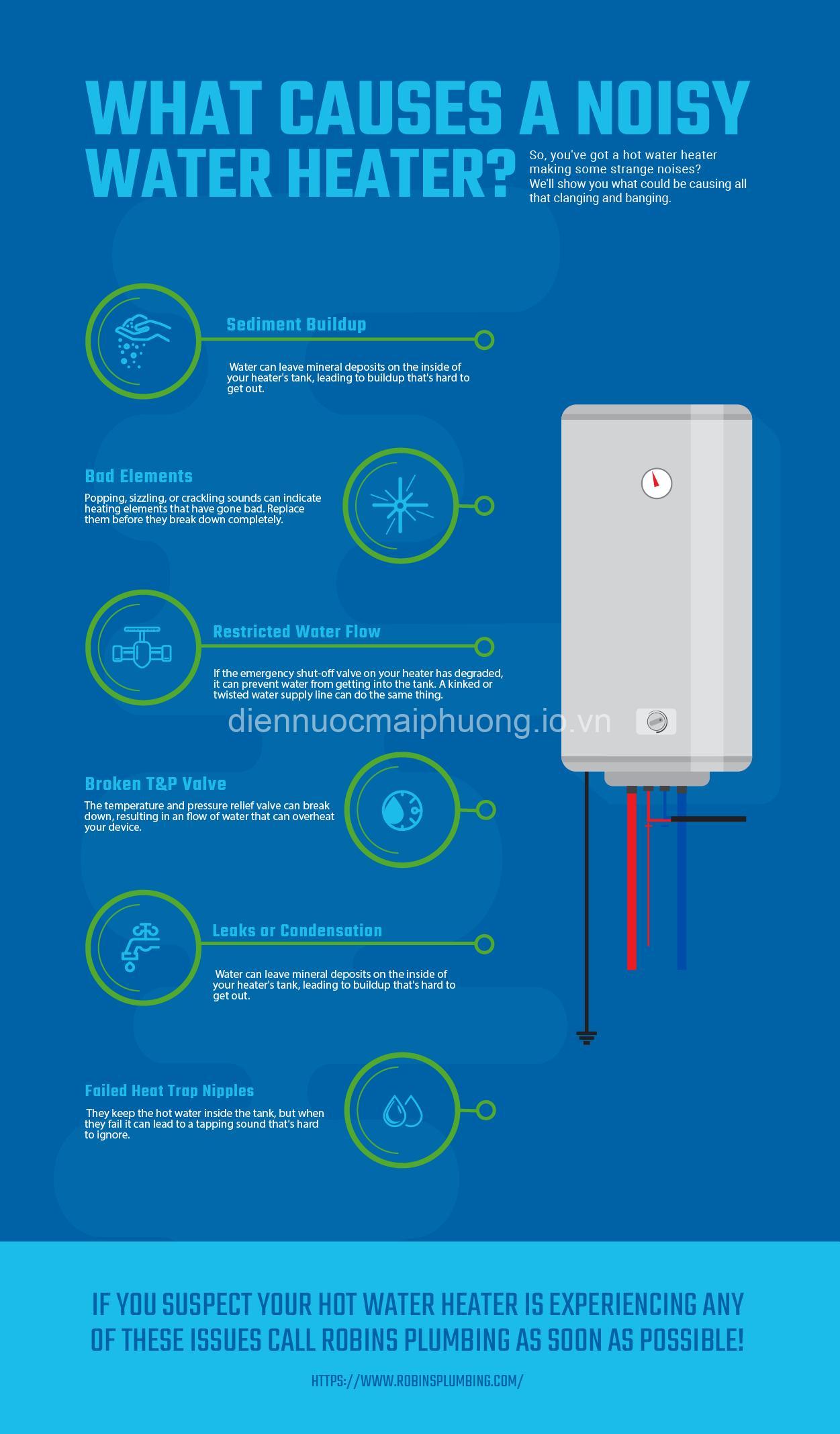Water knowledge
Noisy Water Heater? Common Sounds, Causes, and Fixes
Noisy Water Heater? Common Sounds, Causes, and Fixes. In today’s article, diennuocmaiphuong.io.vn will explore with you in the most detailed and complete way. See now!
Common Water Heater Noises and Their Causes
A noisy water heater is a common issue that can be frustrating and worrying. Understanding the different sounds your water heater makes can help you pinpoint the underlying problem and take appropriate action. Here are some of the most common water heater noises and their possible causes:
Popping or Clicking: This sound is often caused by the expansion and contraction of the water heater tank as it heats up and cools down. Mineral buildup in the tank or pipes can also contribute to popping or clicking. Finally, air trapped in the water heater can also cause these sounds.
Rumbling or Gurgling: A rumbling or gurgling sound is often a sign of sediment buildup in the tank. As the water heats, sediment settles to the bottom of the tank, creating a rumbling or gurgling sound. A malfunctioning thermostat can also cause overheating, leading to a similar sound. Air trapped in the water heater can also result in rumbling or gurgling noises.
Screaming or Whistling: A high-pitched screaming or whistling sound is often caused by high water pressure in the tank. A leaky pressure relief valve can also cause this noise, as it releases excess pressure through a whistle. In tankless water heaters, a malfunctioning pump can also result in a screaming or whistling sound.
Hissing or Bubbling: A hissing or bubbling sound is usually an indication of a leak in the water heater tank. It could also indicate gas leaks in gas water heaters or air entering the system through a leaky pipe.

Troubleshooting Techniques for Noisy Water Heaters
Once you’ve identified the source of the noise, it’s time to troubleshoot the problem. Here are some effective techniques you can try:
- Identify the Noise Source: Listen carefully to the water heater to determine the location and type of noise. Is the noise coming from the tank itself, the pipes, or the pressure relief valve?
- Check the Water Pressure: Use a pressure gauge to ensure the water pressure is within the recommended range for your water heater. High water pressure can lead to a variety of issues, including noisy operation.
- Inspect the Pressure Relief Valve: Check for leaks and ensure the pressure relief valve is operating correctly. If the valve is leaking, it needs to be replaced.
- Flush the Water Heater: Draining and cleaning the tank to remove sediment buildup is a common and effective way to address noisy operation.
- Check the Thermostat: Make sure the thermostat is set to the correct temperature and is functioning properly.
- Inspect the Anode Rod: The anode rod helps to protect the water heater tank from corrosion. If the anode rod is corroded or damaged, it needs to be replaced.
- Check for Leaks: Inspect all connections and fittings for leaks. Any leaks should be repaired promptly.
DIY Solutions for Noisy Water Heaters
There are a few simple DIY solutions that you can try to fix a noisy water heater:
- Flushing the Water Heater: This is a simple and effective way to remove sediment buildup. Follow the instructions in your water heater manual for proper flushing procedures.
- Replacing the Pressure Relief Valve: If the pressure relief valve is leaking or damaged, replacing it is a relatively straightforward task. Refer to your water heater manual for specific instructions.
- Bleeding Air from the Water Heater: Air trapped in the water heater can cause a variety of noises. To bleed air from the system, locate the air vent valve on the top of the water heater and open it slightly. Allow the air to escape until water starts to flow. Close the air vent valve.
- Adjusting the Thermostat: A faulty or misaligned thermostat can cause the water heater to overheat and make noise. Consult your water heater manual for instructions on how to adjust the thermostat.
When to Call a Professional for Water Heater Problems
While you can try some DIY solutions, there are times when it’s best to call a professional plumber. Here are some signs that you should contact a professional:
- Severe Noises or Leaks: If the noise is loud, persistent, or accompanied by leaks, it’s best to call a plumber for professional diagnosis and repair.
- Unusual Smells or Discoloration of Water: If you notice unusual smells or discoloration of the water, it could indicate a serious issue. Contact a professional plumber immediately.
- Water Heater is Old or Nearing the End of its Lifespan: If your water heater is old or nearing the end of its lifespan, a professional inspection might be necessary to determine if replacement is required.
Preventive Maintenance for a Quiet Water Heater
Preventive maintenance is essential for keeping your water heater running smoothly and quietly. Here are some essential tips:
- Regular Flushing: Flush your water heater every 6-12 months to remove sediment buildup.
- Inspecting the Anode Rod: Replace the anode rod every 3-5 years to prevent corrosion.
- Checking the Pressure Relief Valve: Inspect and test the pressure relief valve annually to ensure it’s functioning properly.
Water Heater Safety and Maintenance
It’s important to prioritize safety when working with water heaters. Here are some key safety tips:
- Safety Precautions: Always follow the manufacturer’s guidelines and take necessary safety precautions when working with your water heater. Disabling the water heater during repairs, properly venting gas water heaters, and being aware of potential hazards like gas leaks and electrical shocks are crucial.
- Water Heater Lifespan: The typical lifespan of a water heater is 8-12 years. Proper maintenance can help extend the life of your water heater.
- Water Heater Efficiency: There are several ways to improve water heater efficiency, including using low-flow showerheads, insulating the tank, and setting the thermostat to the appropriate temperature.
Different Types of Water Heaters
There are two main types of water heaters:
- Tank Water Heaters: Tank water heaters are the most common type. They store hot water in a tank, providing a constant supply of hot water. Tank water heaters are generally less expensive to install than tankless water heaters.
- Tankless Water Heaters: Tankless water heaters, also known as on-demand water heaters, heat water only when needed. Tankless water heaters are more energy-efficient than tank water heaters, but they are more expensive to install.
Choosing the Right Water Heater
Choosing the right water heater for your needs depends on several factors:
- Household Size and Hot Water Usage: The size of your household and your hot water usage will determine the size of the water heater you need.
- Energy Efficiency and Cost Savings: Energy-efficient water heaters can save you money on your utility bills.
- Available Space and Plumbing Configuration: The size and location of your water heater will impact your choice.
- Budget and Installation Costs: Consider your budget and the cost of installation when choosing a water heater.
FAQs About Troubleshooting a Noisy Water Heater
What Causes a Popping Noise in My Water Heater?
A popping noise is often a sign of trapped air in the water heater tank or mineral buildup in the tank or pipes.
Why is My Water Heater Rumbling?
A rumbling or gurgling noise is usually caused by sediment buildup in the water heater tank.
What Does It Mean When My Water Heater is Screaming?
A screaming or whistling noise is often due to high water pressure in the tank or a leaky pressure relief valve.
Why Is My Water Heater Making a Hissing Sound?
A hissing or bubbling sound can indicate a leak in the water heater tank, a gas leak in gas water heaters, or air entering the system through a leaky pipe.
Conclusion
A noisy water heater can be a frustrating problem, but understanding the causes and troubleshooting techniques can help you address the issue effectively. By identifying the noise, inspecting the components, and considering preventive maintenance, you can ensure your water heater runs smoothly and quietly for years to come.
For more information on electrical and water products and solutions, visit diennuocmaiphuong.io.vn. Remember, Jessica David Rodriguez, owner of diennuocmaiphuong.io.vn, is here to help you find the best solutions for your home. Leave a comment below to share your experience with noisy water heaters, or ask any questions you may have.
